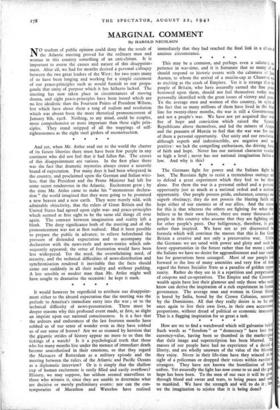It would however be superficial to attribute our disappoint- ment
either to the absurd expectation that the meeting was the prelude to America's immediate entry into the war ; or to the technical difficulty of news-presentation. There must be deeper reasons why this profound event made, at first, so slight an imprint upon our national consciousness. Is it a fact that the ardours and endurances of the last fourteen months have robbed us of our sense of wonder even as they have robbed us of our sense of horror? Are we so stunned by heroism that the gigantic strides of history appear no more to us than the tickings of a watch? Is it a psychological truth that those who for many months live under the menace of immediate death become anaesthetised in their emotions, so that they regard the Massacre of Rotterdam as a military episode and the meeting between the rulers of the Atlantic and Pacific Oceans as a diplomatic interview? Or is it simply that the shallow cup of human excitement is easily filled, and easily overflows? History, we may suppose, has seldom seemed marvellous to those who witness it, since they are unable to determine what are decisive or merely preliminary events: nor can the con- temporaries of Marathon and Waterloo have realised immediately that they had reached the final link in a chain anxious circumstance.
* * * *


























 Previous page
Previous page